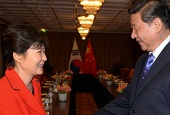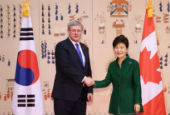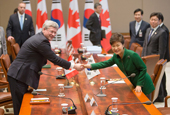Korea and Australia have officially signed a bilateral free trade pact.
Minister of Trade, Industry and Energy Yoon Sang-jick and Australian Minister for Trade and Investment Andrew Robb inked the free trade agreement (FTA) in Seoul on April 8 on the sidelines of the Korea-Australia bilateral summit.
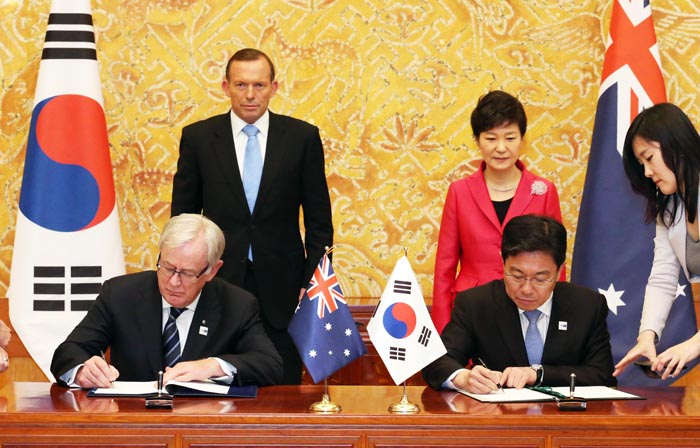
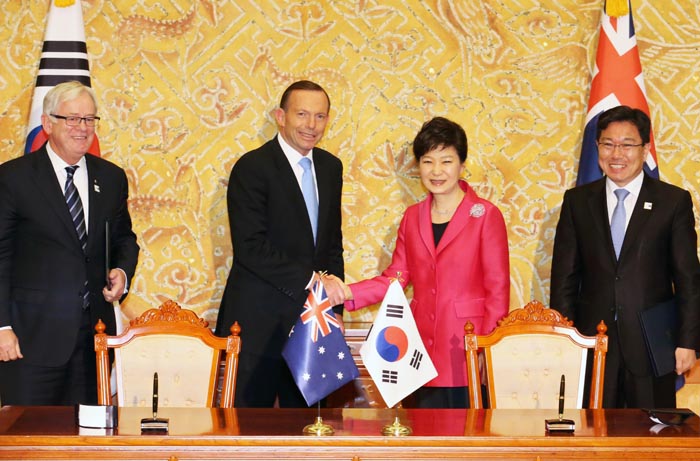
It has been seven years and four months since the two nations agreed to jointly study an FTA, in December 2006. Australia is now the 11th country or region with which Korea has signed an FTA.
With the signing of the agreement, Korea's exports of automotive components to Australia and its imports of agriculture and livestock from Australia, are expected to grow. The two countries' annual bilateral trade is worth USD 30.3 billion. Korea's main exports to Australia are automobiles and petroleum products while Australia's main exports to Korea are natural resources and raw materials, making the relationship complementary.
Under the agreement, Korea will abolish duties on 94.3 percent of its imports from Australia in terms of number of items, or 94.6 percent of its imports from Australia in terms of dollar value, within 10 years. Meanwhile, Australia will eliminate taxes on almost all imports from Korea within five years. In particular, the 5 percent duty on Korean compact cars with an engine displacement of between 1,000 and 1,500 cubic centimeters and midsize cars with engine displacements of 1,500 to 3,000 cubic centimeters, which are two of Korea's major exports to Australia, will be abolished immediately when the FTA goes into effect. In addition, other important exports, including automotive component, electronics, machinery, steel and petrochemical products, are also entitled to the instant elimination of duties. This is likely to expand Korea's exports to Australia.
However, sensitive agricultural and fishery items, including rice, powdered milk, soybeans, potatoes, oysters, pollock and fruit, including apples, pears and persimmons, are not included in the FTA.
The FTA is expected to help secure a stable supply of natural resources and energy for Korea. Among last year's imports, Korea imported 77 percent of its needed aluminum ore, 72 percent of its iron ore, 44 percent of its coal and 20 percent of its zinc all from Australia.
The trade ministry anticipates that the FTA will help increase Korea's GDP by 0.14 percentage points over the next ten years and bring a benefit to consumers worth USD 1.6 billion over the same period.
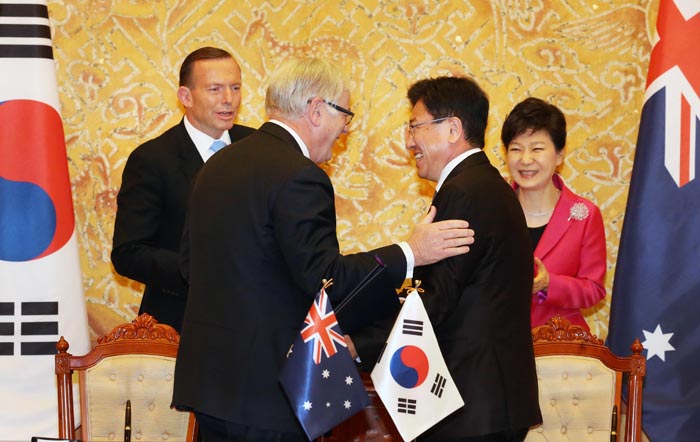
By Wi Tack-whan, Limb Jae-un
Korea.net staff writers
whan23@korea.kr

Minister of Trade, Industry and Energy Yoon Sang-jick and Australian Minister for Trade and Investment Andrew Robb inked the free trade agreement (FTA) in Seoul on April 8 on the sidelines of the Korea-Australia bilateral summit.


President Park Geun-hye (second from right) shake hands with Australian Prime Minister Tony Abbott after the signing of the Korea-Australia FTA at Cheong Wa Dae, on April 8. (photo courtesy of the Ministry of Trade, Industry and Energy)
It has been seven years and four months since the two nations agreed to jointly study an FTA, in December 2006. Australia is now the 11th country or region with which Korea has signed an FTA.
With the signing of the agreement, Korea's exports of automotive components to Australia and its imports of agriculture and livestock from Australia, are expected to grow. The two countries' annual bilateral trade is worth USD 30.3 billion. Korea's main exports to Australia are automobiles and petroleum products while Australia's main exports to Korea are natural resources and raw materials, making the relationship complementary.
Under the agreement, Korea will abolish duties on 94.3 percent of its imports from Australia in terms of number of items, or 94.6 percent of its imports from Australia in terms of dollar value, within 10 years. Meanwhile, Australia will eliminate taxes on almost all imports from Korea within five years. In particular, the 5 percent duty on Korean compact cars with an engine displacement of between 1,000 and 1,500 cubic centimeters and midsize cars with engine displacements of 1,500 to 3,000 cubic centimeters, which are two of Korea's major exports to Australia, will be abolished immediately when the FTA goes into effect. In addition, other important exports, including automotive component, electronics, machinery, steel and petrochemical products, are also entitled to the instant elimination of duties. This is likely to expand Korea's exports to Australia.
However, sensitive agricultural and fishery items, including rice, powdered milk, soybeans, potatoes, oysters, pollock and fruit, including apples, pears and persimmons, are not included in the FTA.
The FTA is expected to help secure a stable supply of natural resources and energy for Korea. Among last year's imports, Korea imported 77 percent of its needed aluminum ore, 72 percent of its iron ore, 44 percent of its coal and 20 percent of its zinc all from Australia.
The trade ministry anticipates that the FTA will help increase Korea's GDP by 0.14 percentage points over the next ten years and bring a benefit to consumers worth USD 1.6 billion over the same period.

Minister of Trade, Industry and Energy Yoon Sang-jick and Australian Minister for Trade and Investment Andrew Robb shake hands with each other after the signing of the Korea-Australia FTA at Cheong Wa Dae, on April 8. (photo courtesy of the Ministry of Trade, Industry and Energy)
By Wi Tack-whan, Limb Jae-un
Korea.net staff writers
whan23@korea.kr
